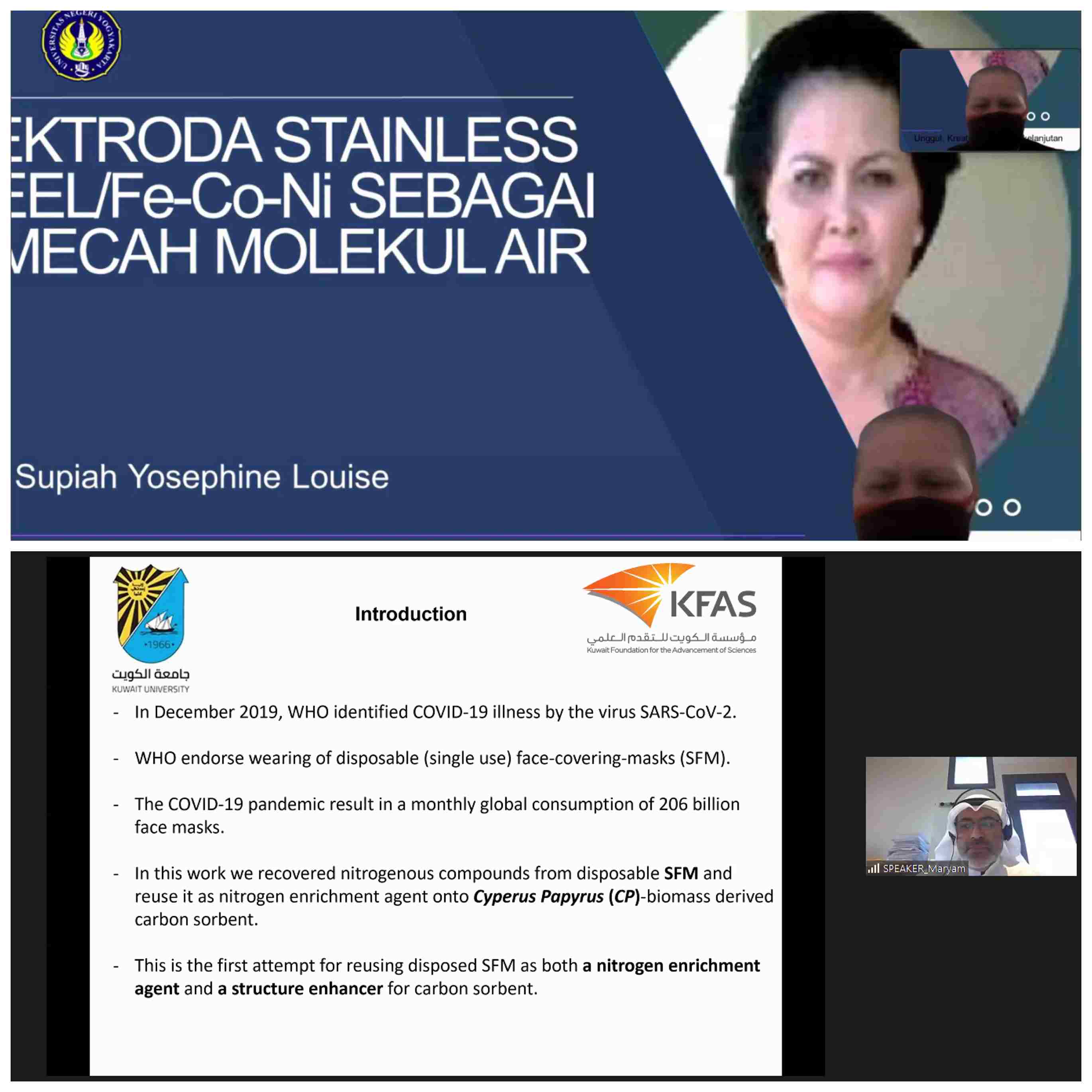You are here
WEBINAR SERIES #1 CHEMISTRY EDUCATION DEPARTMENT, 2022

Friday, 07 October 2022, Chemistry Education Department of FMIPA UNY held Webinar Series #1 to celebrate the 66th Anniversary of Chemistry Study Department of FMIPA UNY with the theme ‘Synergistic in Chemistry Education in Supporting the Post-pandemic Era’ by inviting educational expert speakers. The webinar, which was held online through Zoom Meeting, was attended by 144 participants including teachers, students, lecturers, and education practitioners. Prof. Dr. Jaslin Ikhsan, PhD as Deputy Dean for Academic Affairs and Cooperation of FMIPA UNY gave his remarks as part of the opening of this Webinar Series #1. On this occasion, the Department of Chemistry Education FMIPA UNY brought Prof. Dr. Isana Supiah Y.L. from the Faculty of FMIPA, State University of Yogyakarta and Prof. Ali Bumajdad, Ph.D from Kuwait University.
The first topic was presented by Prof. Dr Isana Supiah Y.L on ‘Stainless Steel/Fe-Co-Ni Electrodes as Water Molecule Breakers’. As we know that water and wastewater are abundant on earth, harnessing them as an energy source is big challenge to do. Water molecules can be split into hydrogen and oxygen gases in various ways. Hydrogen gas is an environmentally friendly fuel, which is capable of replacing fossil fuels, that was depleting in nature so the efforts related to the renewable energy supply need to be well supported by various parties. The electrolysis process is one way to break down water molecules into hydrogen and oxygen gases, but in general it still has low effectiveness. Therefore, further efforts are needed to increase the effectiveness of electrolysis, both in terms of electrodes and electrolytes used.
Next, Prof Ali Bumajdad delivered the second presentation entitled “Reuse of Disposable COVID-19 Surgical Masks as a Nitrogen-Enrichment Agent and Structure Promoter for a wild Plant-Derived Nano-Sorbent”. Prof Ali Bumajdad explained that available wild plant biomass (Cyperus papyrus (CP)) was chosen as the raw material for adsorbent production. A ‘’green-etching‘’ process was used to synthesise the adsorbent with significant modifications without using any chemicals. As observed through characterisation analysis, after mixing SFM with CP at a weight ratio of 1:1, there was considerable development in the specific surface area (SBET = 830 m2/g) for micro (0.333 cm3 /g) and me (0.053 cm3/g) pores as well as diverse functional groups (e.g., amino and carbonyl) on the resulting sorbent. This represents the ability of the adsorbent to remove various pollutants from aqueous solutions. The adsorption capacity of heavy metal ions (Cr(VI)) was used to identify the optimum adsorption parameters. In addition, solid mask residue can change the composition of carbonaceous materials when it was done well and thus can improve the sorption properties. These results can be used as decision-making in the management of plastic waste that surges during the COVID-19 pandemic.
The interactive discussion between the speakers and the participants of Webinar series #1 is an indication that the material presented by the speakers is relevant to the participants' work activities. That way, it is hoped that Webinar Series #1 can be a means of learning together to improve the quality of learning that is more diverse. Furthermore, the Chemistry Education Department of FMIPA UNY still has Webinar Series #2 which will be held on Friday, 14 October 2022, see you! :)
Information System
Kontak Kami
Program Studi Kimia
FMIPA Universitas Negeri Yogyakarta
Kampus Karangmalang Yogyakarta 55281
Telp. (0274)586168 Pes. 115
Email: kimia@uny.ac.id atau s1kimia@uny.ac.id
Copyright © 2026,
